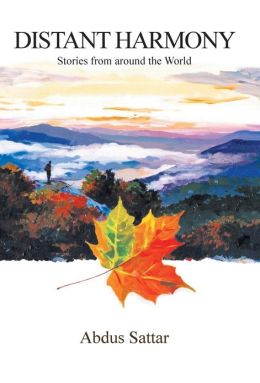Abdus Sattar
Distant Harmony: Stories from around the World
About the Author:
Abdus Sattar began writing while working as a senior advisor of a renowned university. He continues to work in the field of higher education. His writings describe his personal experiences and his discovery in ordinary people. He has written several short stories for magazines and community newspapers and screenplays for short films. Abdus grew up in Bangladesh. He and his wife reside in Dallas, Texas.
 
As a gracious host, Mr. Sattar invites us into the home of his mind,
his memories, and his imaginings. You will see distant lands, smell
exotic scents, and bridge cultural divides through a humanity
that’s universal. In his stories, Abdus both exercises the soul and
wets the thirst of the poet in all of us. He is a heartful warrior who
wields the pen as his sword. Join him in these collected writings!
—Douglas Cure
FOREWORD
I had no clue that my first encounter with Abdus Sattar would so enrich my life. After an Honors luncheon at the university where we both work, I was struggling to haul heavy boxes of dishes downstairs to my car. I knew Abdus by sight but had never officially met him. That day, in his gentlemanly way, he offered assistance. I quickly accepted, handing over the boxes to him even before introducing myself. He asked what I teach, and with the words “English and literature courses,” his eyes widened. After the trek to my car, I said, “I’m so glad to finally meet you, Abdus, and thanks again. Now—I owe you one!”
In his self-effacing way, Abdus asked haltingly, “Could you possibly take a little time and read a story I wrote?”
Used to such requests, I answered, “Of course.” Little did I know that my limited ideas of creative writing and “good” literature were about to be exploded.
Steeped in my doctoral studies at the time, I knew all about Postcolonialism and Postmodern literature—at least, theoretically. Here, however, right before me, were “real life” examples from a “real” person—someone I knew, someone who had asked for my writing advice. Yet, he became my teacher, and I his avid student, as I savored story after story, always astounded by the beauty, poignancy, tragedy, and hope expressed by this non-native English speaker/writer.
Abdus Sattar’s stories portray cruel feudal lords, legacies of colonialism, as well as fluidity of movement in time and space—a dead giveaway of postmodern writing. Yet, he knew nothing of these literary critical theories. Instead, he had lived them, had fleshed them out in his own powerful prose—or, rather, his poetry. His stories do not merely “tell”; they sing. Throughout Distant Harmony, the words of the old Bedouin in “On the Euphrates” become a refrain: “Speak to me of the glory of your heart. Let us sing the song of remembrance.”
Songs of remembrance resonate from the continents of Africa, Asia, and Europe, back to the United States, where the narrator has settled. Although he knows the riches of his adopted country, he longs for his beloved Bangladesh, where his “heartbeats mingle with the pulse of the earth.” Along with the narrator of each beautifully rendered story, readers journey from continent to continent, finding beauty in all of nature and every example of humanity. Although tales of poverty, grief, loss, and hunger are “sung” throughout disparate cultures and diverse peoples, the refrain always riffs with a deep love of humanity and unquenchable dignity of the human spirit.
In “Glory of the Dust,” the narrator reveals the source of his beliefs: “My mother’s lessons of the oneness of living things were for me a new way of loving nature and humanity and finding strength there, and it remains so today. . . . For all of us life is a gift to be revered as divine.”
This divine gift resounds throughout Abdus Sattar’s poetic prose. With stunning language, the writer harmonizes distant melodies of political oppression, poverty, tragic loss, regret, and longing, yet always tempered with love and hope. “The Price of Freedom” ends with such an image: “And somewhere, off in the distance, a mother kingfisher has just laid her eggs.”
From that first story shared with me, through the culmination of Distant Harmony, I want to thank you, Abdus, for showing me what true literature can be.
Peggy Ruff, Ph. D.
Chair of English and Literature
Distinguished Honors Professor
Dallas, Texas
Let the proceeds of this book, our insights, initiative and words of wisdom evoke the mood and deepen the meaning of life of a cancer patient. Proceeds are donated to MD Anderson Cancer Center, Houston, Texas, USA.
Abdus Sattar

|
